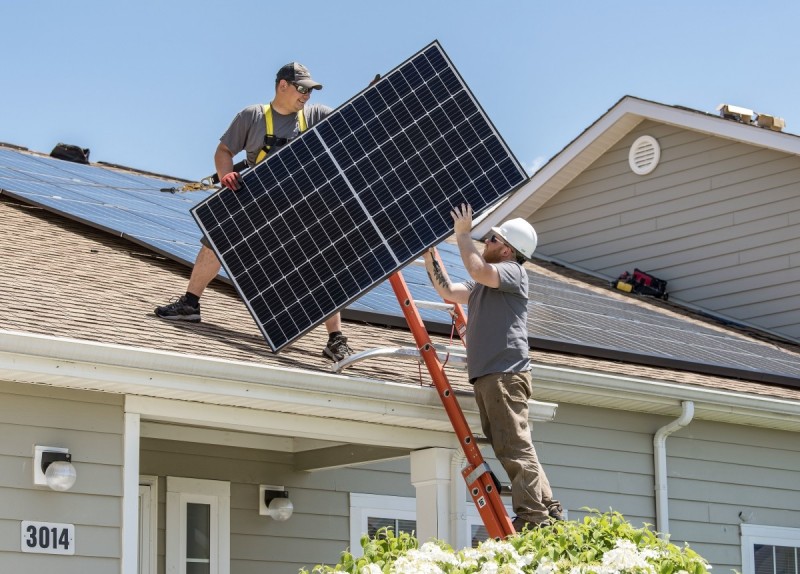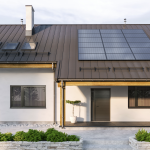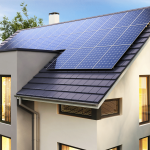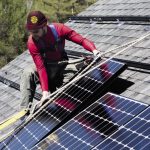In the quest for sustainable living and a reduced environmental footprint, many homeowners in the United States are turning to solar energy as a viable solution. The installation of solar systems at home is gaining popularity not only for its environmental benefits but also for the potential long-term savings on energy costs. This article explores the intricacies of solar system installation in the US, covering the process, benefits, challenges, and considerations for homeowners looking to harness the power of the sun.

The Solar Installation Process:
Solar system installation is a multi-step process that begins with a comprehensive assessment of the property. Solar professionals evaluate factors such as roof orientation, available sunlight, and potential shading to determine the optimal placement of solar panels. This initial analysis is crucial for designing an efficient and effective solar energy system.
Following the site assessment, the design phase involves creating a customized solar system tailored to the specific needs and energy consumption patterns of the household. The design undergoes a permitting process to ensure compliance with local regulations and building codes. Once approved, the installation process can commence.
The physical installation involves mounting solar panels on the roof or ground, installing the inverter to convert generated direct current (DC) power into usable alternating current (AC) power, and connecting the system to the household’s electrical panel. Trained and certified technicians carry out this step to ensure the safety and efficiency of the installation.
After the installation is complete, the system undergoes inspection by local authorities to verify compliance with safety and quality standards. Upon approval, the solar system is interconnected with the local utility grid, allowing homeowners to utilize solar-generated electricity and, in some cases, feed excess energy back into the grid.
The Pros of Solar Energy Installation:
- Reduced Energy Costs: Perhaps the most significant advantage of solar system installation is the potential for substantial long-term savings on energy bills. By generating their own electricity, homeowners can decrease or eliminate their reliance on traditional power sources, resulting in decreased energy costs over time.
- Environmental Benefits: Solar energy is a clean, renewable resource that produces minimal greenhouse gas emissions during electricity generation. Choosing solar power contributes to a more sustainable future, reducing carbon footprints and supporting the global effort to combat climate change.
- Financial Incentives: The federal government, along with many states, offers financial incentives to encourage solar adoption. The Solar Investment Tax Credit (ITC) provides homeowners with a tax credit of up to 26% of the solar system’s cost, making solar installation more financially appealing.
- Increased Home Value: Homes with solar installations tend to have higher resale values. As energy efficiency becomes a sought-after feature among homebuyers, a solar-powered home is often perceived as a valuable and environmentally friendly investment.
- Energy Independence: Solar energy systems provide homeowners with a degree of energy independence, reducing vulnerability to fluctuations in traditional energy prices and grid outages.
The Cons of Solar Energy Installation:
- High Initial Costs: While solar system installation offers long-term savings, the initial costs can be relatively high. Homeowners may need to make a significant upfront investment, although this can be mitigated by financing options and government incentives.
- Weather-Dependent: Solar energy production is weather-dependent, meaning that energy generation may be affected on cloudy days or during inclement weather. However, advancements in technology and the ability to store excess energy are helping address this limitation.
- Space Requirements: The amount of available roof or ground space may impact the efficiency of the solar system. Homes with limited space may not be able to generate as much electricity as larger properties.
- Aesthetic Impact: Some homeowners may be concerned about the aesthetic impact of solar panels on the appearance of their homes. However, advancements in design and the increasing social acceptance of solar installations are alleviating this concern.
- Maintenance Costs: While solar systems generally require minimal maintenance, occasional inspections and potential repairs may incur additional costs. It’s essential for homeowners to factor in these maintenance considerations when considering solar installation.
Considerations for Homeowners:
- Roof Condition and Orientation: Assess the condition and orientation of your roof before committing to solar installation. A well-maintained roof with proper orientation can significantly impact the efficiency of the solar system.
- Local Regulations and Permits: Familiarize yourself with local regulations and permitting requirements for solar installations in your area. Compliance with building codes and permitting is crucial to a smooth installation process.
- Energy Consumption Patterns: Analyze your household’s energy consumption patterns to determine the size of the solar system needed. Consider future changes in energy needs, such as the addition of electric vehicles or home expansions.
- Financing Options: Explore financing options, including cash purchases, solar loans, or leasing agreements. Each option has its own set of advantages and considerations, so choose the one that aligns with your financial goals.
- Choosing the Right Installer: Selecting a reputable and experienced solar installer is paramount. Research local companies, read customer reviews, and obtain multiple quotes to ensure you choose a provider with a track record of quality installations and customer satisfaction.
The installation of solar systems at home in the US represents a significant step towards a sustainable, energy-efficient future. Despite some challenges, the numerous benefits, including reduced energy costs, environmental impact, and increased home value, make solar installation an appealing option for homeowners. By carefully considering the pros and cons, understanding the installation process, and making informed decisions, homeowners can confidently embark on the journey of harnessing solar energy to illuminate their homes and contribute to a cleaner, greener world.






